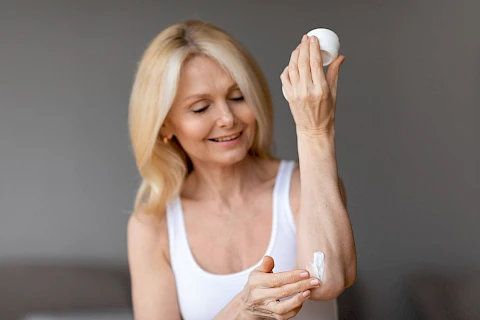
Skin care becomes crucial to health management during the chilly winter months, especially for seniors. The cold air, low humidity, and indoor heating can wreak havoc on the skin, making it dry and fragile. Maintain skin health for seniors with chronic conditions like diabetes or autoimmune disorders. These health conditions can exacerbate skin issues, leading to complications if not addressed properly. Learn some practical tips for caregivers to help seniors manage their skin care during the challenging winter months.
Challenges of Winter Skin
Winter presents unique challenges for skin care, particularly for seniors. The cold weather can strip the skin of its natural oils, increasing dryness and sensitivity. Seniors with chronic conditions face even more significant problems. Diabetes reduces blood flow, causing the skin to become even drier and more fragile. Autoimmune disorders may result in rashes and heightened sensitivity. Recognizing these issues is the first step in preventing skin problems during winter.
Choosing the Right Skin Care Products
Gentle, fragrance-free products are the best choice for seniors with sensitive skin. Fragrances and harsh chemicals may irritate the skin, leading to dryness and rashes. When choosing moisturizers, look for hydrating ingredients such as hyaluronic acid or glycerin, which help retain moisture. For cleansers, opt for mild, soap-free options that won't strip the skin of its natural oils. Reading labels makes a big difference, so familiarize yourself with the ingredients and their benefits.
Daily Skin Care Routine
A good skincare routine makes a significant difference in maintaining skin health.
- Start with a gentle cleanser to clean the skin without over-drying it.
- Follow up with a moisturizer to lock in hydration. Applying moisturizer immediately after bathing while the skin is damp enhances its effectiveness.
- Stay hydrated. Encourage seniors to drink plenty of water throughout the day.
- A humidifier is a great addition to the home, adding moisture to the air and preventing the skin from drying out.
- When bathing, advise seniors to use lukewarm water instead of hot and to keep showers short to avoid further drying the skin.
Monitoring Skin Health
Caregivers should look for signs of skin issues such as redness, cracking, or unusual spots. If any of these signs persist, seek medical advice to prevent complications. Regular skin checks help to identify any issues early on. Caregivers can help maintain skin health by observing changes and ensuring appropriate care.
Preventing Complications
Make preventing skin injuries and infections a priority. Injury prevention involves caution around sharp objects and ensuring a safe living environment to avoid cuts and bruises.
Manage underlying chronic conditions. Keep blood sugar levels in check to significantly reduce the risk of skin complications for diabetic seniors.
Protect the skin from harsh weather elements. Encourage seniors to wear gloves and scarves outside to shield their skin from the cold wind.
At Senior Helpers Lawrence We Can Help
Prioritize skin care during winter, particularly for seniors with chronic conditions. If you reside in Lawrence, Methuen, Andover, Haverhill, or Essex County and seek support for caring for your senior loved one, please contact us at Senior Helpers Lawrence. Our dedicated staff would love to tell you more about our services for seniors and their caregivers, such as Personal and Chronic Disease Care.